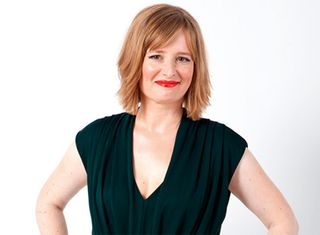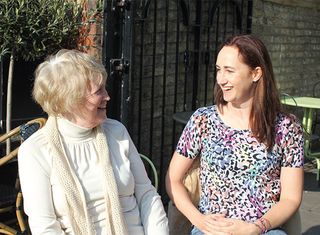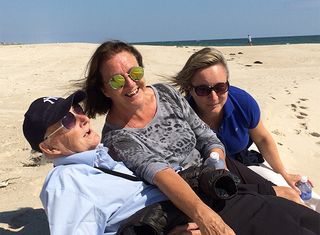Mothers & Daughters: 'Frustratingly Mum Is Usually Right'


Columnist and author Lucy Mangan, 40, lives in London with her husband and their son
Last year, at the age of forty, I wore red lipstick in front of my mother for the first time. "That's nice," she said approvingly. "It makes you look like something you're not." This is what can only be called the maternal reverse-ferret. She is increasingly fond of these in her - and indeed what feels like my - old age.
My mother spent the first 35 years of my life making sure no one in the family stepped out of line. Ours was a controlled household. No drinks with soup (soup is a drink and a meal). No long hair (neither of her two daughters had thick enough tresses to be deemed worthy of being grown past a near-convict crop). No sitting on the sofa if the cushions had just been bumphled. No going upstairs in daytime (antisocial. Not that it mattered. You were generally too dehydrated to cope with moving uphill anyway).
I strongly believe that Kim Jong Il maintained his stranglehold over the North Korean populace by writing to my mother for pro tips.
And of course, in the Ministry of Love no make up was allowed. Artifice of any kind was discouraged, and never more so than when it came to your face or clothes. That you be clean and decently covered was your duty to God and man.
There would be no making the best of what you had. My parents were (are) Northern, and lived by the moral philosophy embodied in the timeless Lancastrian adage: "If we had some ham we could have ham and eggs, but we've no eggs."
So I grew up knowing my place and making every effort not to step out of the exceptionally well-defined zone I had had marked out for me. I didn't rebel. It never even crossed my mind as an option.
Sign up for the woman&home newsletter
Sign up to our free daily email for the latest royal and entertainment news, interesting opinion, expert advice on styling and beauty trends, and no-nonsense guides to the health and wellness questions you want answered.
But times change and - albeit far more slowly - people change with them. Over time, the hammer of Ma Thor fell more lightly on transgressors. Sometimes it barely cracked a skull. Eventually it started glancing off shoulders or missing the target entirely. Her heart was no longer in it.
And now the most unexpected things are greeted with delight and interest instead of disapproval. Like red lipstick. And the fact that it makes you look like something you're not.
Now, whether she means "dynamic, confident, stylish woman" or "prostitute" I am not sure. But for the first time in her and our life she is reveling in misdirection. Our old relationship has exploded and I am still circling it warily, waiting for the pieces to land and see what new form they will take. It is an exciting but anxious time. Happy unsettling Mother's Day.

Writer Clare Mackintosh, 39, lives in the Cotswolds with her husband and their three children. She is the author of Sunday Times bestseller I Let You Go (Sphere)
My mother pressed something small and metallic into my hand. ‘For Alex,' she said. ‘To keep him safe.' It was a piece of jewellery she had worn for as long as I could remember, a charm featuring St Christopher, the patron saint of travellers. Legend has it that St Christopher carried a young child across a river, despite grave danger, only for the child to reveal himself as Christ.
My parents had given me a St Christopher when I moved to Paris for a year, aged seventeen, and now my mother's own silver charm would accompany my first-born to his final resting place.
It was mid-December 2006, and while other families were getting ready for Christmas, my mum was helping me prepare for my son's funeral. My twin boys had been born twelve weeks prematurely, and although both had initially thrived, Alex contracted meningitis and subsequently suffered a massive brain haemorrhage.
My husband and I had him baptised in hospital, and on 10 December 2006 we instructed the doctors to withdraw medical care. He passed away in our arms. Afterwards, the charge nurse asked if there was someone at home. ‘We've got each other,' I said, numb with grief.
‘Go somewhere else tonight, if you can,' the nurse said gently. ‘You think that because you're going through a shared experience, that you can look after each other, but it's like asking two people with ‘flu to take care of each other. You need someone to look after you.'
I knew exactly who that person should be. We drove in silence to my parents' house, resenting every carol playing on the radio; every twinkling light in every street. As we pulled up outside my family home my mother opened the door and I started to sob. ‘I can't survive this,' I said, feeling as though my heart had been torn in two. She stroked my hair, held me tight and said, ‘you can, and you will.'
Throughout my childhood she had always been there to pick me up when I fell; always putting me and my sisters before her own needs. Even then, when all our family and friends were reeling from Alex's death, my mum allowed me to be selfish in my grief. It was only recently that I understood how devastated she was - and still is - that she never had the opportunity to hold her grandson. Her heart was breaking not only for her own loss, but from seeing her daughter in such unimaginable pain. Despite this it was my mum who spoke to the undertaker and called the vicar to arrange the funeral; I can't even imagine how hard that must have been for her.
I was an adult before I realised the sacrifices my mother had made over the years to keep me safe and make me happy, and it was only when I had children of my own that I understood why she had done so. There is nothing you wouldn't do for your children. On the day before Alex's funeral my husband decided to go and see him one last time. I couldn't go with him - I didn't want to remember him that way - and I hated myself for not being stronger. The thought of the funeral terrified me. ‘I can't bear the thought of him being all alone,' I had said to my mother, moments before. ‘All cold and dark, with no one to hold him.' She left the room, returning minutes later with the St Christopher. ‘For Alex. To keep him safe.' It was neither the first, nor the last, time my mother has known exactly what to do or say to support me, but it is undoubtedly the most significant.
In the years that have passed since that cold December I have shed many tears for my precious boy, but I have taken great comfort from knowing that he isn't alone. My mother's St Christopher carried my son across the river and for that, I will always be grateful to her.

Sophie Kinsella, 46, lives in London with her husband and their five children. Her latest book, Shopaholic to the Rescue (Black Swan) is out in paperback on 10 March
For as long as I can remember, I've clashed with my mother over shoes. Aged four, I craved the shiniest plastic slip-ons, rather than the sensible buckled Mary Janes I was forced into. Aged ten, I asked for high heels. (‘No.') Aged twelve, I was given a pair of cast-offs by an au pair: patent, black, spiked-heeled emblems of joy. My mother hated them; I loved them.
Then we moved to Dorset where I attended an old-fashioned convent. There was a hideous regulation shoe and my mother decreed we must buy them. But my sister and I had spent a day at the school and seen girls wearing a variety of footwear. ‘No-one wears those gross brown shoes,' we protested.
My mother went so far to check with the headmistress: was it really the case that girls had to wear the approved style? ‘Yes, all the girls wear them,' came the answer. To misquote Mandy Rice-Davies: she would say that, wouldn't she?
On our first day we put on the hateful shoes and went into the fray. At four o'clock, my sister and I burst out of school, burning with outrage: ‘No-one wears the approved shoes! Only us!' My mother was genuinely mortified. On the other hand, shoes are expensive. So we were landed with the wretched things for the whole year.
It was a rare case of my mother being wrong. In most cases she is, frustratingly, right. My mum and I rarely clash any more, but she does have a habit of pointing stuff out and being right about it. Sometimes it's something as small as a heel height. Sometimes it's something as big as the fact - recently - that I was overworking and heading for exhaustion. I denied it, I argued... The truth was, I was overworking but I didn't want to admit it.
Now I have a daughter myself, I understand that delicate balance. And I also understand how hard it is to bite your tongue. At the moment, all my four-year-old girl wants is high heeled shoes. Preferably plastic and covered in glitter. Do I let her wear them? Not a chance.

Helen Simonson, 52, was raised in East Sussex and now lives in New York with her husband. They have two grown-up sons. Helen's latest novel, The Summer Before the War (Bloomsbury), is published on 24 March.
I have always been close to my mum but we do take our mothers for granted, don't we? More recently I have come to the realisation not just of how much I admire her but why. It has taken our relationship full circle as I have rediscovered that awe for a parent that we all lose somewhere in our teen years; when we begin to think we know so much more than them.
It began when I attended an event at her local library in south-west France, where she and my father moved three years ago, and I watched her mingle with her new friends. I could hear the anxiety in her voice as she spoke French and see the way she nodded and smiled when she couldn't keep up with how fast her French neighbours replied. As she introduced colleagues from her Beginner French class, they laughed together over the incomprehensibility of French TV news and she told a funny story of trying to get the doctor to understand her using pigeon English and charades. I wondered if they knew how much she struggled every week with the language class. I wondered if they knew her struggle was compounded by hearing loss, a barrier she dismisses by saying "many people suffer and we push on anyway."
It struck me just how courageous my mum was to move to a new country at the age of seventy-two. And I understood that she had embraced this adventure not without fear, but despite it. She would probably rather undergo root canal than talk in French, but talk French she must and talk French she does.
I began to remember other times she had pushed on. How daunting it must have been for a mother, who left school at fifteen and took whatever jobs helped the family budget in times of need, to decide to take up the Open University and pursue her A levels? And how inspiring that a woman with a dread of public speaking would spend so many years as a local councilor, outspoken in pursuit of youth centres, play spaces and better drains? She laughs now and says she could never stop her knees knocking but she couldn't sit still when she saw injustice.
Mostly I remembered how I married my American sweetheart at twenty-two and left England without a backward glance. I remember how my mother never once asked me to stay or made me feel guilty. Now that my eldest son is leaving home for a far-flung city, I bite my tongue and understand just how much courage it took for my mum to smile and wave. I picture her small figure on the Queen's Terrace at Heathrow, watching the big plane lift off from the runway. How she pushed on through... just as she is now with learning French.
-
 The White Company's Hypoallergenic Mattress Topper is surprisingly affordable and a dream to sleep on
The White Company's Hypoallergenic Mattress Topper is surprisingly affordable and a dream to sleep onThe The White Company Hypoallergenic Comfort Topper offers a gentle, supportive layer to your sleep set-up for a surprisingly affordable price.
By Laura Honey Published
-
 Gwyneth Paltrow’s classic pinstripe pyjamas will keep you cool and comfortable on warm nights
Gwyneth Paltrow’s classic pinstripe pyjamas will keep you cool and comfortable on warm nightsChic and comfortable? Her stylish pyjama set is our new go-to
By Charlie Elizabeth Culverhouse Published